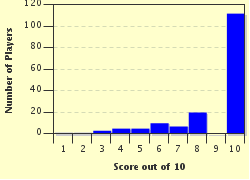Quiz Answer Key and Fun Facts
1. Discovered the existence of buoyant force
2. Formulated the theorem stating that the square of the hypotenuse of a right triangle is equal to the sum of the squares of the other two sides
3. Proposed heliocentrism
4. Formulated the law of universal gravitation
5. Improved the microscope
6. Described the flow of blood in the circulatory system
7. Determined the value of absolute zero in temperature
8. Formulated the law which describes how the pressure of a gas increases while the volume of the gas decreases
9. Was the pioneer of quantum mechanics
10. Proposed the theory of relativity
Source: Author
DeepHistory
This quiz was reviewed by FunTrivia editor
bloomsby before going online.
Any errors found in FunTrivia content are routinely corrected through our feedback system.

